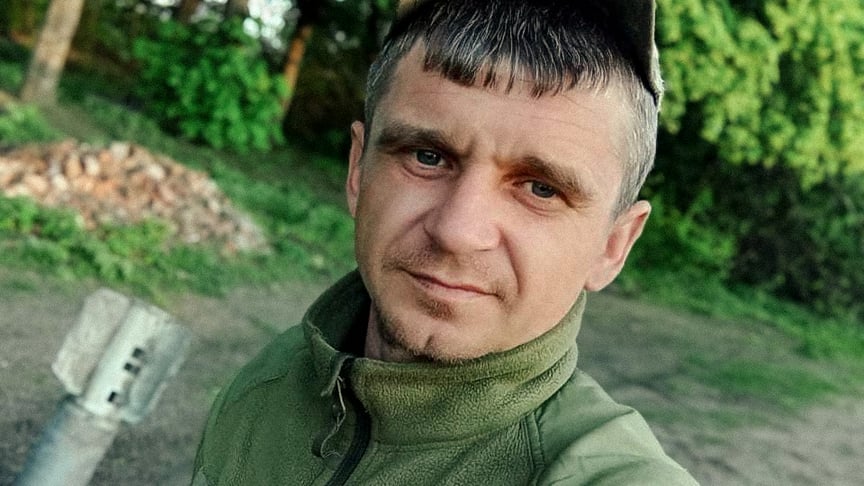Betrayal after injury, new love, and changing light bulbs: Zaporizhzhia’s only taxi driver with prosthetic leg

I ordered a taxi in Zaporizhzhia. For the first time in three days on this work trip, a Ukrainian-speaking driver showed up. We got to talking, and Serhiy tapped his right metal leg: “I drive with a prosthesis.” We exchanged numbers and later spoke by phone. The veteran shared how he went to serve, got wounded and crawled out of a Soviet MT-LB APC without a leg, how his girlfriend left him, how he recovered, and how he found a new job and new love. And how he dreams of returning to his army mates.
Explosion left him with no leg
Serhiy Krasniak was mobilized in 2015. The 25-year-old fought for years in eastern Ukraine, then stayed on with his 93rd Brigade under contract.
“It pulls you in. At first, I craved the adrenaline, then I wanted more and more to make sure Russians didn’t exist,” he explained.
On February 11, 2022, his contract was ending, but his commander wouldn’t let him go: “War’s coming. We don’t know where we’ll be sent, but you’ll stay with your guys.” Ten days later, they deployed to defend Kharkiv Oblast, then Sumy Oblast near the border. For months, artillery scout Serhiy was in hot zones. In May 2022, near occupied Izyum, his “motolyha” (MT-LB, a light armored personnel carrier) hit an anti-tank mine.
“There was an explosion, but I didn’t panic and started climbing out,” he recalled. “Usually, you push off with your right leg, almost jumping. But I felt nothing to push against and thought, ‘Guess my leg’s gone.’ It didn’t hurt. I looked: gone at the kneecap. Had to get out, tried leaning on my left leg, but it was broken, shredded by shrapnel. Somehow, I dragged myself through the hatch using my arms. Got caught on my vest strap, dangling. I thought, ‘Well, I’m stuck here like a Christmas ornament.’ Kept struggling, fell to the ground, and applied a tourniquet to my leg. Then the guys ran up and evacuated me.”
Surgeons in Poltava amputated his leg 8 centimeters above the knee. Treatment and rehab took eight months. He described it: “At first, medics put me in a wheelchair so I could go outside to smoke. I couldn’t do anything; everything hurt, even moving. Tried crutches, but my muscles had atrophied. I started walking in fall 2022. Tried driving a car, liked it, and bought this Ford — it’s easier than walking.”
Serhiy has a hydraulic prosthesis, which is better than a mechanical one: it controls movement, adjusts to walking speed, and reacts to stumbles or steep climbs, helping him stay stable. But it presses over time, causing pain if worn too long.
The state paid for it. Serhiy dreams of an electronic prosthesis, which is tailored to the user and praised by those who have it. It charges in a car and is controlled by a phone app. But it costs about 2 million hryvnias ($48,027), and he’d need to buy it himself. Brothers-in-arms who have one crowdfunded theirs, but Serhiy hesitates to ask: “People are struggling enough in this war.”
Old love faded, new love bloomed
At the time of the full-scale invasion, Serhiy was divorced with a 5-year-old daughter and had a girlfriend.
“I was used to her, loved her,” he said reluctantly. “But after my injury and recovery, when I was discharged home, we split. She said she didn’t want to cook borsch — though I always cooked — or sit by the window, not ready for marriage. Really, it was because of my disability.”
Six months later, Serhiy needed a nanny for his daughter while he ran errands, as her mother was out of town.
The nanny, Viktoria, came once, then again. She fell for the girl’s dad, and he fell for her.
They dated, and earlier this year, they got married. Viktoria is 29, Serhiy is 35, and they dream of having a child together.
“I didn’t have male fears that I’d fall short for my love or couldn’t do something without a leg. I’m confident,” he shared. “If something doesn’t work, it’s no big deal to ask for help, though I don’t want to always be the one asking.” He told Viktoria about a TV story of a western Ukrainian priest who lost both legs to frostbite 20 years ago (Serhiy meant Ivan Teremko from a hromadske report, who serves in two churches, does housework, drives, volunteers, and even invited the reporter to dance — author’s note).
“The priest’s wife said, ‘He doesn’t want to seem helpless, so he never asks for help. I just know what he needs’. I showed Viktoria the story, saying I wanted that kind of relationship. I can do a lot myself; she doesn’t need to fuss over me. But I’d like her to notice when things get tough. Like, while I’m hopping to the closet for a shirt, she can grab it. It’s that mutual understanding where one starts, the other picks up.”
Recently, he changed a ceiling light bulb, discovering a broken socket that needed unscrewing. He climbed a chair, holding the backrest, with Viktoria steadying him — he managed. Another time, he installed a door lock himself.
“I think you can get used to doing almost anything,” he said. He’s glad he doesn’t fight with Viktoria, warning her not to bother him when he’s emotionally on edge: “I can snap — it happens, I’ve got war trauma. Just don’t say anything in that moment, wait it out, and I’ll cool off fast,” the Zaporizhzhia native says.
He adds lovingly that he does everything to make his wife feel happy.
You can still work without an arm or leg
After his injury, Serhiy was discharged from military service as unfit. Unwilling to sit idle, he tried taxi driving. He’d heard of a Zaporizhzhia driver with no arm; he’s the only one with no leg. In two years, he’s done 1,600 trips.
“It’s not as many as it could be; I don’t drive morning to night — too much strain on my leg. I do 7 a.m. to noon, rest, then go out at 5 p.m. for about three hours. Up to 10 trips a day,” he said.
He doesn’t help male passengers with luggage but always gets out to load suitcases for women. “It’s not hard to carry heavy stuff; getting in and out of the car is tougher,” says Serhiy.
Passengers rarely ask about his injury; sometimes older folks thank him for his service, but it’s rare.
I asked how he adjusted to life with a disability, knowing it would be different.
“It depends on character. Gloomy types who complain get worse, start drinking. Lively ones bounce back, find work, and get married. I had bitter moments, despair — it’s a lifelong injury. But it’s good to have someone who smiles, who supports you. That’s my wife. We’ve been together two years; most couples are already bickering, but we’re good. I’m happy.
To guys in my situation, I’d say: Nothing will change, but life goes on. Grumbling leads to drinking. Try something new. If you’re always scared of bad thoughts, like our parents taught us — ‘Why get a moped? You’ll fall, it’ll break’ — nothing will happen. Act boldly. No arm, no leg — you can work, earn. And more: don’t just take any job because you’re disabled and have no choice. Do what you love.”
Before taxi driving, Serhiy tried returning to the army. His commander gave contacts of units that promised, “Yeah, no problem.”
“I begged, said I know I can’t sit in a trench. But I can cook or deliver supplies. Just not at headquarters — I want to be near the guys. They refused. Probably because I’m unfit, off the military register, and if something happened, they’d be held responsible.”
- Share:

